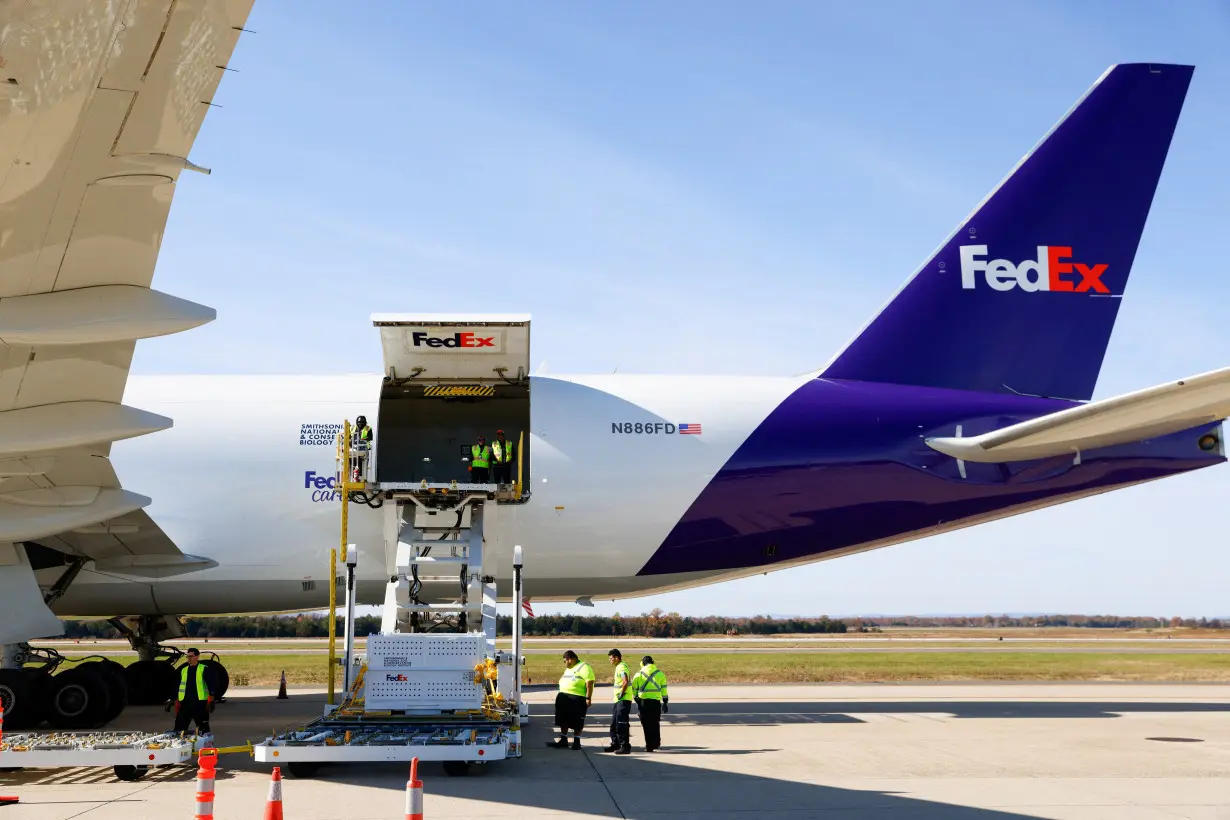By Kevin Fogarty and Rich McKay
WASHINGTON (Reuters) - Washington's National Zoo bid a tearful farewell to its beloved trio of giant pandas on Wednesday as the long-serving goodwill ambassadors to the U.S. capital began a journey back to China that was announced earlier this year.
The bears - Mei Xiang, Tian Tian and their cub Xiao Qi Ji - hunkered down in crates made of steel and plexiglass that were lifted into a truck and then loaded into a Boeing 777F cargo plane dubbed "FedEx Panda Express." They left in the early afternoon from Dulles International Airport with a load of bamboo, apples and pears to munch on during the 19-hour, 9,000 mile flight.
The pandas, accompanied by three zookeepers, will travel to a reserve in China’s mountainous Sichuan province, where an estimated 1,800 pandas are still found in the wild, according to the National Zoo.
Zoo director Brandie Smith choked back tears at a brief ceremony ending more than a half century in which pandas have been residents.
"It's been a hard week, but ultimately our focus today is on the safe transport of these animals to China," she said.
"It's a moment of joy because this is one more step in 50 years of a successful giant panda conservation program and hopefully the beginning of 50 more years of successful giant panda conservation," she said.
Mei Xiang, 25, and Tian Tian, 26, arrived at the National Zoo in 2000. Their first three cubs, born between 2005 and 2015, are thriving in China. Xiao Qi Ji - “Little Miracle” in English - was born three years ago, making his mother the oldest giant panda ever to give birth in the U.S.
Pandas live about 30 years under human care, but about 15-to-20 years in the wild, the zoo said on its website.
The trio, made famous by the zoo's "Giant Panda Cam" with more than 100 million views, were part of a fading legacy in which giant pandas served as animal ambassadors.
It began in 1972, when the government of China presented two giant pandas as gifts to the U.S. after President Richard Nixon's historic Cold War visit to the communist country.
Except for the initial gifts, giant pandas have been leased to U.S. zoos under contracts with the China Wildlife Conservation. In recent years, such contracts have not been extended.
The departure of Washington's three bears follows the return of pandas from Memphis and San Diego zoos, leaving only four giant pandas in the U.S. Those animals, residents of Georgia's Zoo Atlanta, are scheduled to return in 2024.
It was not clear if or when the zoo will get more pandas.
Kimberly Blalock, a young visitor at the National Zoo on Tuesday, was among the last to see the pandas on display in Washington.
"I hope they can come back," she said. "I'm going to miss them and I want to hug them."
(Reporting by Kevin Fogarty and Kia Johnson in Washington, additional reporting and writing by Rich McKay in Atlanta; Editing by David Gregorio)

 Fed's Powell may have made US monetary policy boring again
Fed's Powell may have made US monetary policy boring again
 Can AI chatbots make your holiday shopping easier?
Can AI chatbots make your holiday shopping easier?
 Canadian banks to show mixed Q4 earnings as mortgage renewals, rate cuts loom
Canadian banks to show mixed Q4 earnings as mortgage renewals, rate cuts loom
 Canada pulls refugee welcome mat, launches ads warning asylum claims hard
Canada pulls refugee welcome mat, launches ads warning asylum claims hard
 Stellantis drops as CEO Tavares' resignation brings fresh uncertainty
Stellantis drops as CEO Tavares' resignation brings fresh uncertainty
 Dollar flexes on Trump swipe, French politics, yuan slide
Dollar flexes on Trump swipe, French politics, yuan slide
 2024 in Reuters pictures
2024 in Reuters pictures
 Guinea stadium crush kills 56 people after disputed refereeing decision
Guinea stadium crush kills 56 people after disputed refereeing decision
 Soccer-Major stadium disasters over recent decades
Soccer-Major stadium disasters over recent decades
